If you’re eating carnivore or low-carb, you’ve probably heard that salt is important — but sodium is just one piece of the electrolyte puzzle. Without the right balance of potassium, magnesium, and other minerals, many people feel tired, foggy, crampy, or “off,” even if they’re eating nose-to-tail.
This guide explains exactly what’s going on with your electrolytes on a meat-based diet, what symptoms to watch for, and how to fix the imbalances without guesswork.
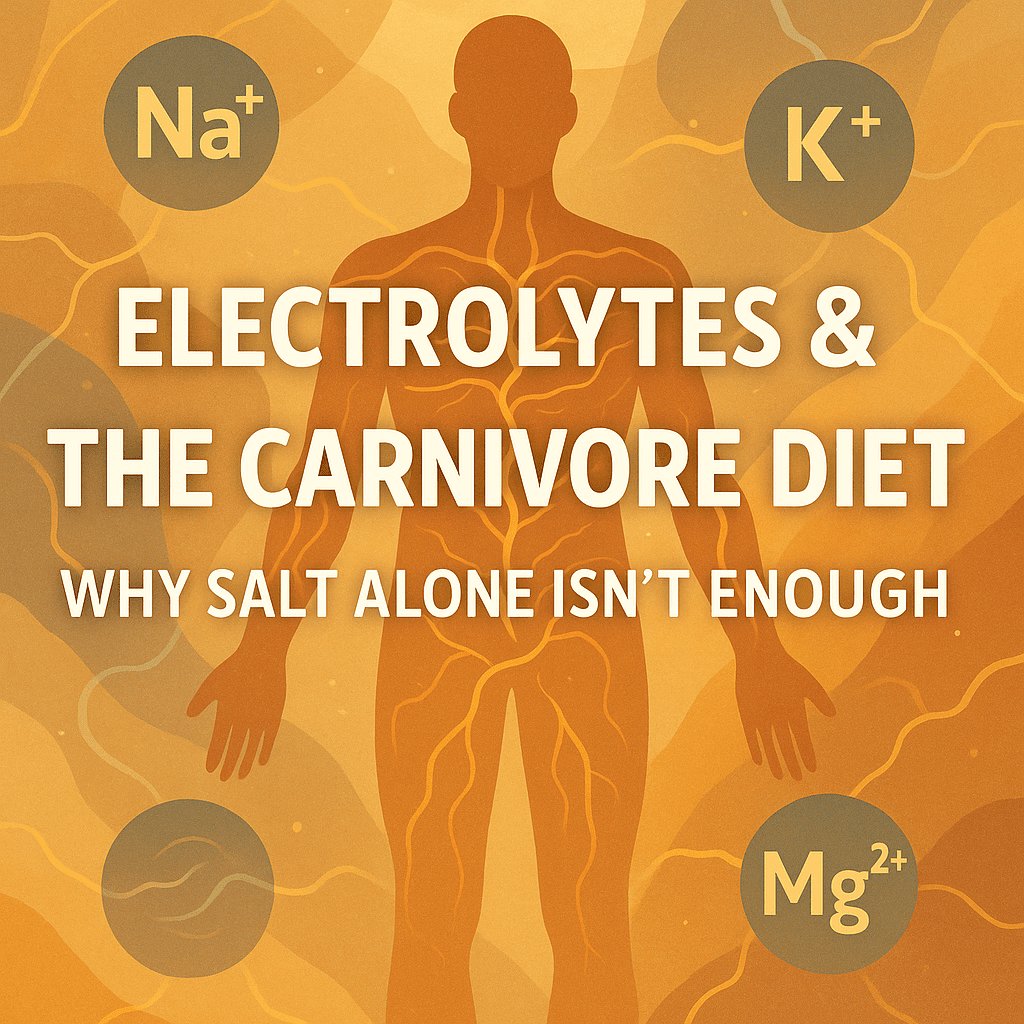
📚 Table of Contents
- A Personal Note from My Recovery
- What Electrolytes Are and Why They Matter
- How Carnivore Changes Your Electrolyte Needs
- Symptoms of Electrolyte Imbalance on Carnivore
- Sodium: The Foundation You Can’t Skip
- Potassium: The Quiet Balancer
- Magnesium: The Third Pillar
- Calcium & Chloride: The Forgotten Ones
- How to Build a DIY Electrolyte Stack
- Common Mistakes to Avoid
- Final Thoughts: Balance Over Blind Supplementation
- FAQ
- Electrolytes Deep Dive Podcast
- Where to Buy Electrolytes & Supplements
- Key Studies & Expert Resources
🏥 A Personal Note from My Recovery
When I was in recovery after having a stent fitted, I experienced something that still sticks with me. I had a raging thirst — not just mild dehydration, but a deep, almost desperate need for water. I was troubling the nurse all night, constantly asking for more water and another one of those cardboard urinals. They hold about a litre, and I must have filled five of them that night.
At one point I told the nurse, “I think I need salt.”
She said no. Salt’s bad for your heart, she told me — and that was that.
But I knew my body. I wasn’t sweating, I wasn’t overhydrated, and I certainly wasn’t sodium-toxic. I was flushing fluid as fast as I could drink it — and I was craving salt because my body was screaming for it.
This is why understanding electrolytes isn’t just a “keto thing” or a performance hack. It can be the difference between feeling okay and feeling like your circuits are misfiring. In my case, it wasn’t about macros or fat loss — it was about restoring the mineral balance that keeps everything running, from the brain to the heart.
I’m not saying ignore medical advice — I’m saying ask questions. Understand what your body is telling you. And if you’re recovering from surgery, fasting, sweating, or eating carnivore — don’t underestimate the role of sodium, potassium, and magnesium.
You’ll know when you need them.
What Electrolytes Are and Why They Matter
Electrolytes are charged minerals that help your body:
- Regulate fluid balance
- Maintain muscle and nerve function
- Control blood pressure and heart rhythm
- Support energy metabolism and cellular function
The key players are:
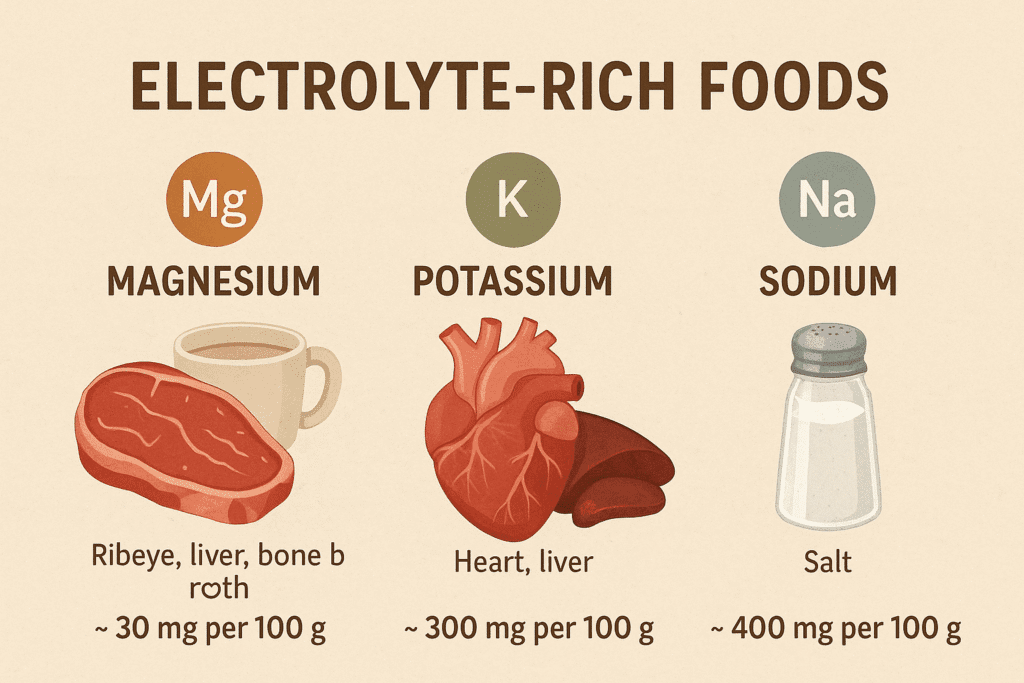
| Electrolyte | Function |
|---|---|
| 🧂 Sodium (Na⁺) | Controls blood volume and hydration |
| 🍌 Potassium (K⁺) | Supports muscle contraction and nerve signals |
| 🧬 Magnesium (Mg²⁺) | Essential for energy, muscle relaxation, and enzyme function |
| 🥛 Calcium (Ca²⁺) | Needed for muscle contraction, nerve firing, and bones |
| 🌊 Chloride (Cl⁻) | Balances other electrolytes and stomach acid production |
They work as a team. Deficiency or imbalance in one affects the others.
—
How Carnivore Changes Your Electrolyte Needs
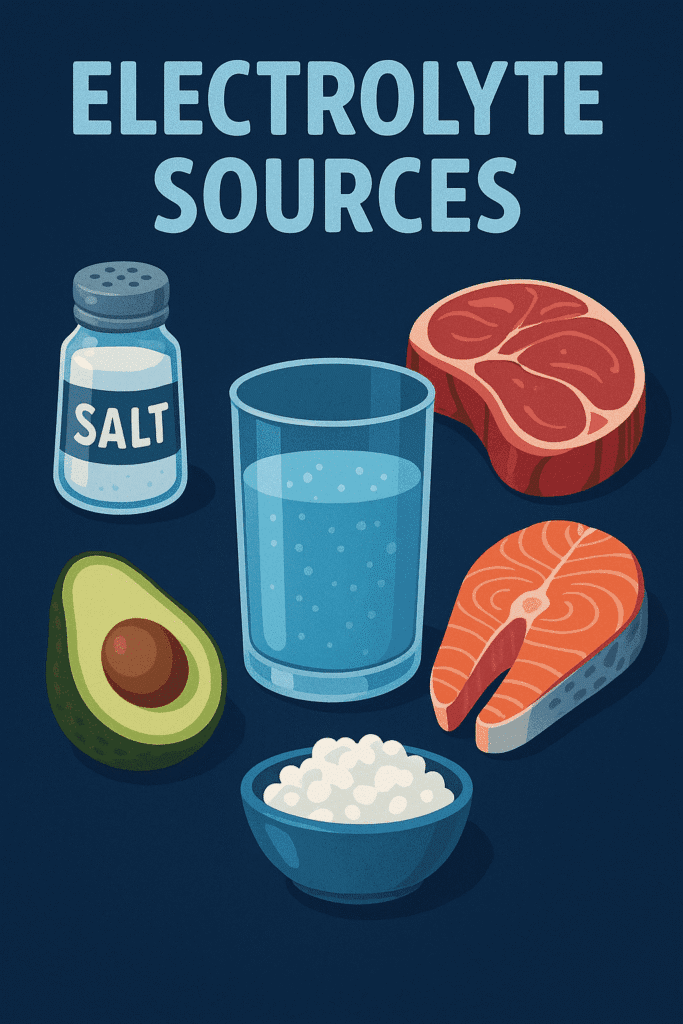
Low-carb and carnivore diets drastically shift how your body handles fluids and minerals:
- Lower insulin = kidneys excrete more sodium
- Water follows salt → increased urination → potassium and magnesium loss
- No plant foods = reduced potassium intake
- High meat = high phosphorus = possible interference with magnesium absorption
- Many carnivore dieters don’t eat organs, fish, or bone broth — key mineral sources
This is why so many people feel “off” in the first few weeks (or months).
Symptoms of Electrolyte Imbalance on Carnivore
If you’re experiencing any of the following, electrolyte imbalance might be the culprit:
- Dizziness or lightheadedness
- Muscle cramps or twitches
- Heart palpitations
- Headaches
- Fatigue, especially after meals
- Salt cravings
- Insomnia or poor recovery from workouts
- Bloating after eating too much salt
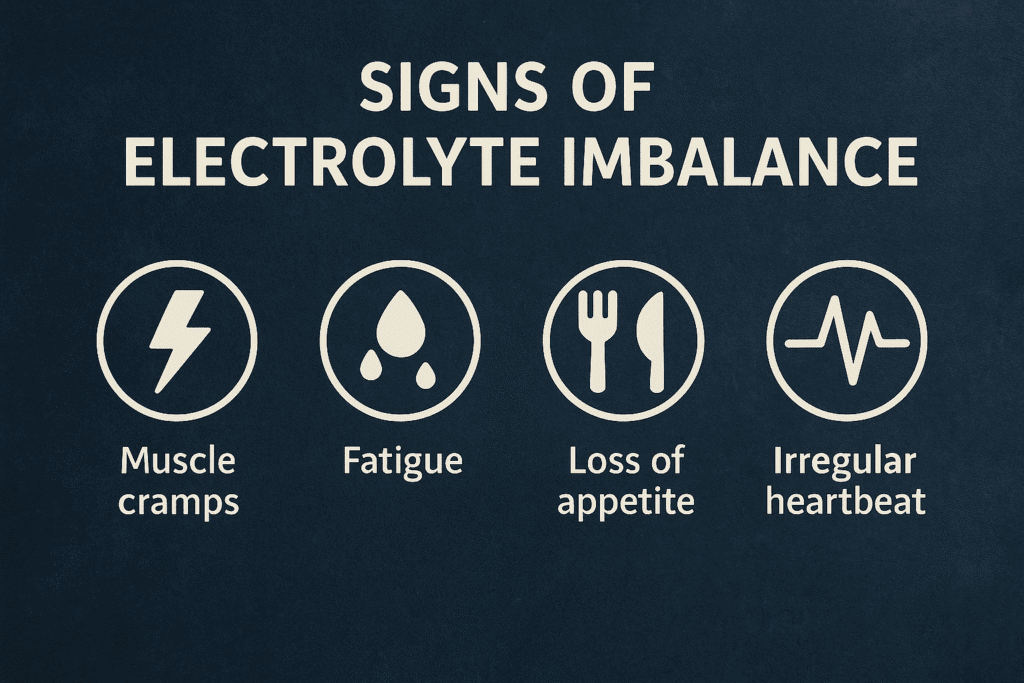
Don’t ignore these — they’re messages from your nervous system and fluid balance.
Sodium: The Foundation You Can’t Skip
Sodium is essential, not optional, on a carnivore diet.
- Without carbs, your insulin levels drop, and you lose sodium rapidly.
- Low sodium = low blood volume = low energy, dizziness, and salt cravings.
🧂 Recommended intake:
- Moderate activity: 4–6g sodium/day (≈ 2 tsp salt)
- High activity or sauna use: 6–8g/day or more
- Use real sea salt or Himalayan salt for trace minerals (but not required)
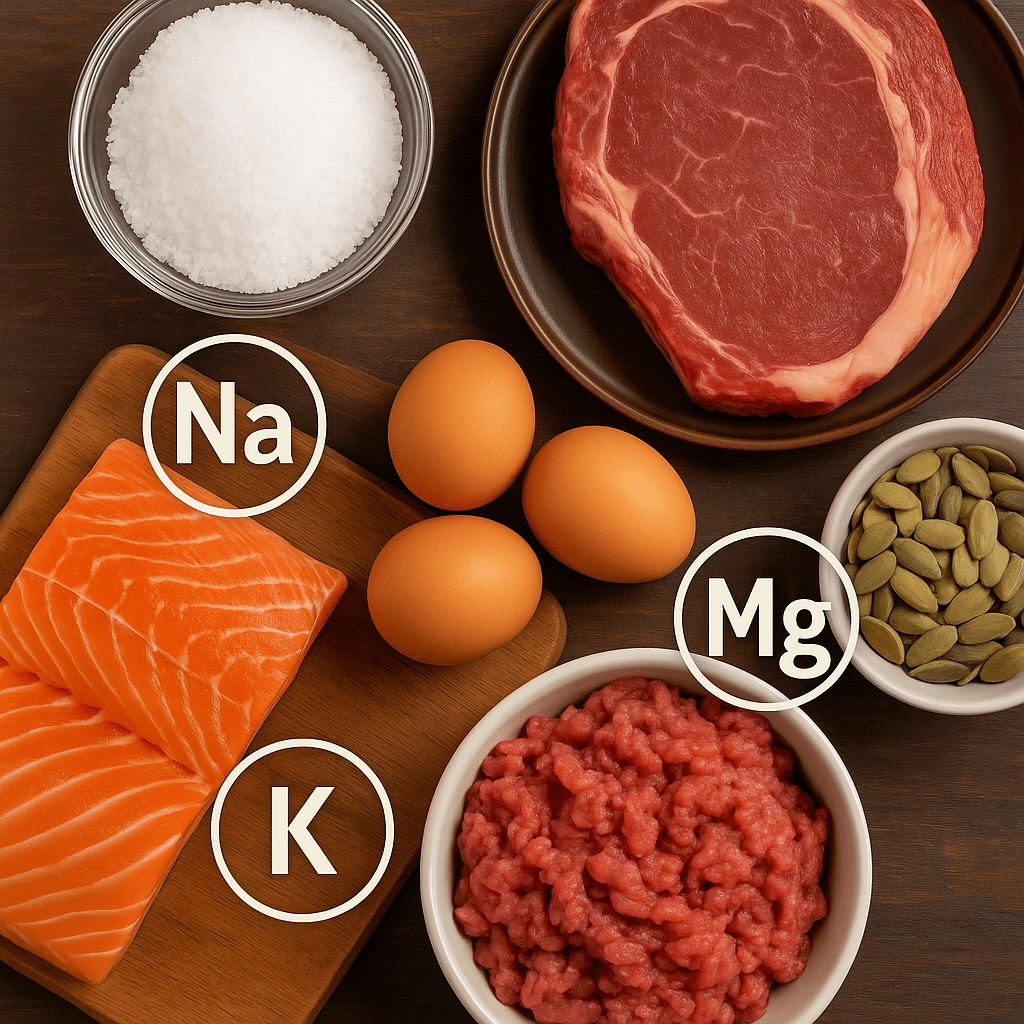
Drink water with salt throughout the day — not all at once.
Potassium: The Quiet Balancer
Potassium balances sodium. Without it, you may feel:
- Crampy or stiff
- Fatigued after eating salt
- Moody or “wired but tired”
- Prone to muscle spasms or palpitations
Most people don’t get enough potassium on carnivore. Plant foods are high in K⁺ — meat isn’t.
🍖 Carnivore potassium sources:
| Food | Potassium per 100g |
|---|---|
| Beef | ~300mg |
| Heart | ~400–500mg |
| Liver | ~450mg |
| Bone broth | ~100–300mg per cup |
| Sardines (with bones) | ~400mg |
🍌 Supplement options:
- Potassium chloride (NoSalt, LiteSalt)
- Potassium citrate (gentler, alkaline-forming)
- Potassium gluconate (low dose)
⚠️ Don’t take large doses all at once. Spread 200–500mg servings across the day.
Magnesium: The Third Pillar
Already covered in detail here: Why Magnesium Matters on a Carnivore Diet
Quick recap:
- Essential for nerve calm, muscle relaxation, energy
- Lost in urine, sweat, stress
- Deficiency common even in meat eaters
- Best forms: glycinate (calm), malate (energy), taurate (heart rhythm)
- Start with 200–400mg/day and adjust to bowel tolerance
—
Calcium & Chloride: The Forgotten Ones
🦴 Calcium:
- Not usually deficient if you eat dairy or small fish with bones
- Bone broth, bone meal, and sardines are your friends
- Supplement only if you’ve eliminated all bone sources
🌊 Chloride:
- Found in salt (NaCl)
- Rarely deficient on carnivore unless salt intake is very low
- Supports stomach acid and digestion
—
How to Build a DIY Electrolyte Stack
💧 Start with this base mix (per liter of water):
| Ingredient | Amount |
|---|---|
| Sea salt | 1–1.5 tsp (~2000–3000 mg sodium) |
| Potassium chloride | 1/4–1/2 tsp (~500–1000 mg potassium) |
| Magnesium glycinate or malate | 200–400mg elemental magnesium |
| Optional: lemon juice, taurine (500–1000mg), trace minerals |
🧠 Tips:
- Sip over 3–4 hours
- Use during fasts, post-sauna, or after training
- Adjust salt up/down based on cravings, bloating, or blood pressure
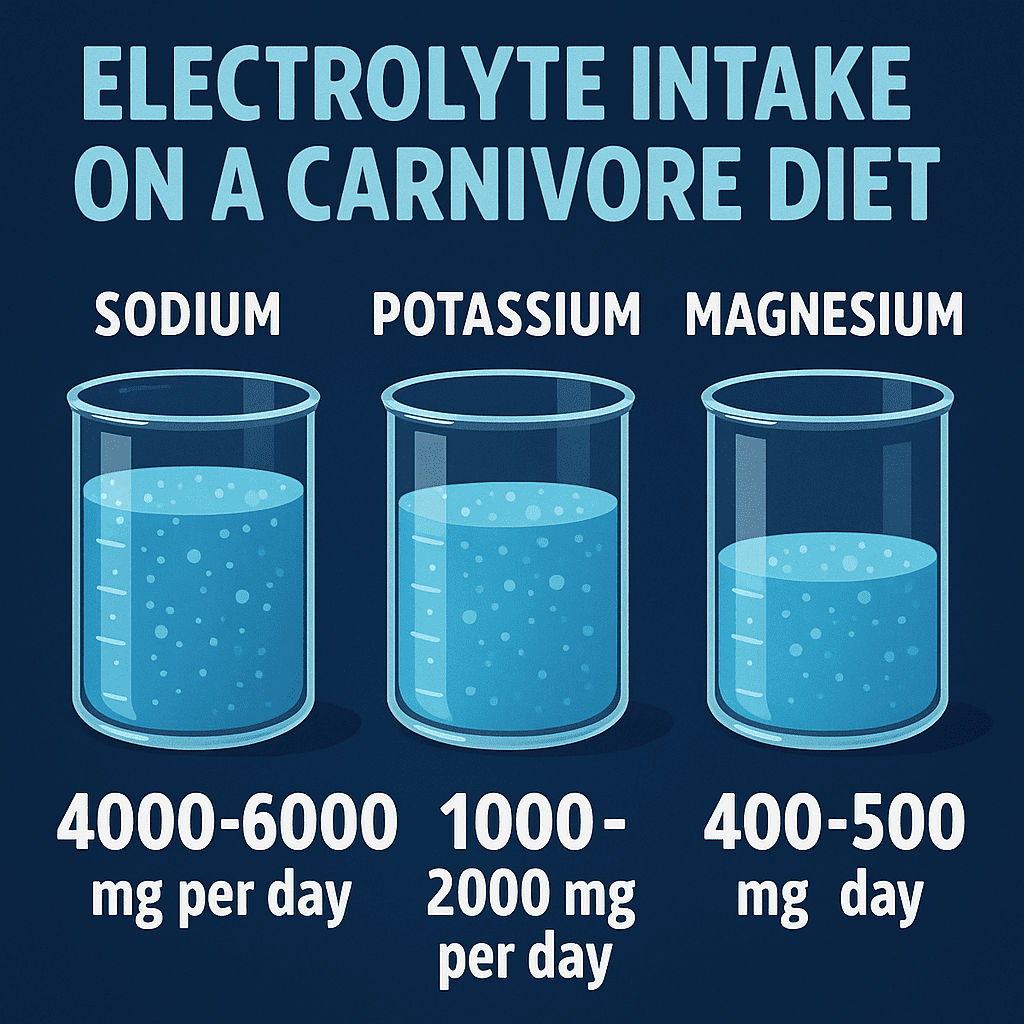
Common Mistakes to Avoid
❌ Over-salting without potassium
❌ Drinking only water
❌ Avoiding salt out of fear
❌ Taking potassium in one large hit
❌ Ignoring magnesium when cramps or sleep issues persist
—
Final Thoughts: Balance Over Blind Supplementation
Carnivore diets shift your body into a different metabolic state — one that demands more attention to electrolytes. While sodium is foundational, potassium and magnesium are just as important. Start slow, balance intake, and listen to your body.
Your energy, focus, recovery, and mood will thank you.
Carnivore & Electrolytes FAQ
Electrolyte Podcast
For a much deeper dive into electrolytes, please listen to the podcast below. In this AI-hosted podcast, Ai-den and Ai-nita explore the role of electrolytes in low-carb, zero-carb, and carnivore nutrition.
🛒 Where to Buy Electrolytes & Supplements
Looking for high-quality electrolytes or individual minerals like magnesium, potassium, or sodium?
Disclosure: This article contains affiliate links. As an Amazon Associate, I may earn a small commission from qualifying purchases—at no extra cost to you.
Here are search links to help you explore trusted options by region:
🇬🇧 United Kingdom
🔍 View Magnesium Supplements on Amazon UK
🔍 Electrolyte Mixes & Mineral Support – Amazon UK
🔍 Potassium Chloride (NoSalt, LiteSalt) – Amazon UK
🇺🇸 United States
🔍 View Magnesium Supplements on Amazon US
🔍 Electrolyte Powders & Capsules – Amazon US
🔍 Potassium Salts & Citrate Options – Amazon US
⚠️ Note: When choosing a supplement, look for brands that:
- Disclose full ingredient breakdowns
- Use clearly labeled forms (e.g. magnesium glycinate vs “magnesium complex”)
- Are third-party tested or GMP-certified
- Avoid unnecessary fillers, sugar, or artificial flavors
🔬 Key Studies & Expert Resources
- Assessing the Nutrient Composition of a Carnivore Diet
A 2024 study evaluated the micronutrient adequacy of four versions of the carnivore diet against national nutrient reference values. The findings indicated that while the diet met several nutrient thresholds, it fell short in magnesium, calcium, and potassium, among others.
🔗 PubMed – Assessing the Nutrient Composition of a Carnivore Diet - Electrolyte Imbalance: Types, Symptoms, Causes & Treatment
The Cleveland Clinic provides a comprehensive overview of electrolyte imbalances, detailing symptoms such as muscle cramps, fatigue, and irregular heartbeats, which are pertinent to individuals on restrictive diets like carnivore.
🔗 Cleveland Clinic – Electrolyte Imbalance Overview - The Importance of Electrolytes for the Carnivore Diet
Nutritionist Judy Cho discusses the critical role of electrolytes in a carnivore diet, emphasizing the need for sodium, potassium, and magnesium to maintain hydration and overall health.
🔗 Nutrition with Judy – Electrolytes & Carnivore Diet - How to Get Electrolytes on Carnivore Diet
This article explores various ways to obtain essential electrolytes like sodium, potassium, and magnesium through animal-based foods and supplements, tailored for those following a carnivore diet.
🔗 Carnivore Snax – Electrolytes for Carnivore Diet - Electrolytes on a Carnivore Diet: The Ultimate Guide to Electrolyte Balance
Health Coach Kait provides an in-depth guide on maintaining electrolyte balance while on a carnivore diet, including practical tips and food sources rich in essential minerals.
🔗 Health Coach Kait – Electrolytes on Carnivore Diet - Keto Electrolytes: Tips and Concerns
This article discusses the importance of electrolytes in low-carb diets, highlighting how imbalances in sodium, potassium, and magnesium can lead to symptoms commonly referred to as the “keto flu.”
🔗 H.V.M.N. Blog – Keto Electrolytes - How Much Sodium, Potassium, and Magnesium Should I Have on a Ketogenic Diet?
Dr. Stephen Phinney and the Virta Health team provide guidelines on the recommended intake of key electrolytes for individuals on ketogenic diets, which can be applicable to carnivore diets as well.
🔗 Virta Health – Electrolyte Recommendations - The Keto Flu: Symptoms and How to Get Rid of It
Healthline outlines the symptoms of the “keto flu,” often experienced during the initial stages of low-carb diets, and offers strategies to alleviate these symptoms through proper electrolyte management.
🔗 Healthline – Keto Flu Symptoms and Remedies





